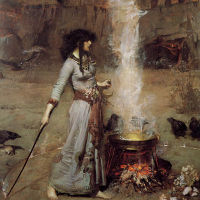What organization there was behind the older faiths practiced by the Greeks and Romans was functionally lost as the priest of gods like Zeus and Poseidon were perfectly willing to convert to the new state religion of Christianity. Their offices having originally been largely political and they continued to remain so. No loss for them.
They sold out their gods. I suppose all they cared about was who had the most power. Yes, and in time most of the non-priestly caste would care little either. But some did continue to keep what they were able to learn and understand from their old observances, and these would come to blend with new ideas about the old pagan gods. The early policy of the Catholic Church was to keep any temples that were built by the original cultures, and once they were “purified” of their daemonic taint, wait for people to gather there again as they were the centers of their communities by default anyway.
Making it look familiar makes it easier to convert them. That is why they kept a good deal of pagan symbolism as decoration. They just buried it in dogma and thus you have things like the modern form that Easter takes. The pagan celebrations just became communal holidays, harmless parties. Rabbits were a long standing symbol of sexual fecundity.
So the old gods evolved in what became a largely Catholic world and remained so for many hundreds of years without real disturbance. It would only come later that the teaching of what would then be named Wicca would come to public light. As far as history and culture goes, Wicca shares a fair bit in common with Spanish Brujeria.
Is that because more of the Brujeria tradition survived? Actually, the same amount and for the same reasons. Brujeria was just Wiccans parallel on the American continent. Wicca resurfaced in the UK, and spread both in the publicized form as well as newly adapted forms and less publicized forms. In a sense, paralleling the family martial arts schools of China and Japan including the history of rivalry and repression. Of course the rivalry being between mainstream religion and the spooky family traditions that people were doing in their homes or remote places, rather than those that might break out into “kung-fu fighting” to risk a little humour.
Now we get to things that are connected to witchcraft even if the association is doubtful, practices like the black mass and what not. My earlier quip about kung fu fighting did have a manifestation of sorts. The tension between those who preserved what they could of the older pagan values and the church’s doctrine would at times reach a fevered though covert pitch, and in order to blow off steam they would devise rituals that would challenge the power of the god of the church. The crimes reputed to take place during these little acts of rebellion were of course distorted, and many of the accusations false, as they would no more defy their own values then the church would defy their own. Rationalizations that lead to things like child labor and other such negative things arose not from any witches but from mainstream Christians. The pagans valued life and celebration and fertility, joy, etc., things that led the church to see them as licentious and hedonistic, even lazy.
So the modern images of the older gods have a heavy layer of early Christian culture mixed in, and much of Wiccan theological thought and teaching stems from the same sources as Catholic philosophy did, the teachings of Socrates and Plato and such. That and the early contact between people like the Druids and the Greeks say, adapted even the Druid culture so it accounted for the classical thinking, and this is the foundation of what they have today. It’s a thumbnail and if it feels superficial once again my apologies. Tracing a unified thread for the modern phenomenon called Wiccan is virtually impossible if not actually impossible.
Your thoughts are welcome. Be well friends.
Travis Saunders
Dragon Intuitive
~science,mysticism,spirituality~

